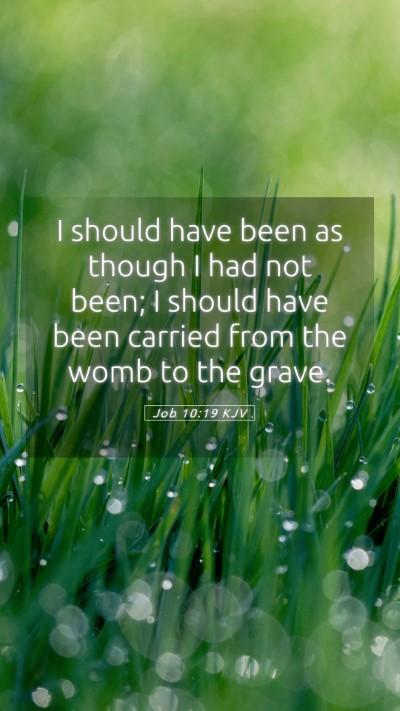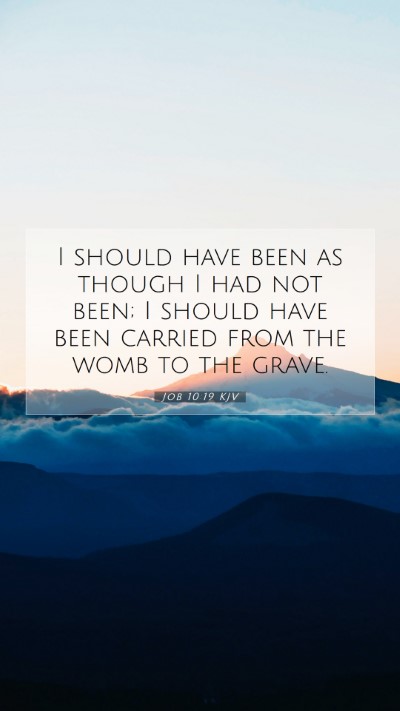Old Testament
Genesis Exodus Leviticus Numbers Deuteronomy Joshua Judges Ruth 1 Samuel 2 Samuel 1 Kings 2 Kings 1 Chronicles 2 Chronicles Ezra Nehemiah Esther Job Psalms Proverbs Ecclesiastes Song of Solomon Isaiah Jeremiah Lamentations Ezekiel Daniel Hosea Joel Amos Obadiah Jonah Micah Nahum Habakkuk Zephaniah Haggai Zechariah MalachiJob 10:19 Meaning
What is the meaning of Job 10:19?
I should have been as though I had not been; I should have been carried from the womb to the grave.
Job 10:19 Bible Verse Meaning
Understanding Job 10:19
Job 10:19 states, "I should have never been born. I should have been carried straight from the womb to the grave." In this verse, Job expresses deep despair and reflects on the suffering he experiences. This verse serves as a poignant testament to his profound sense of hopelessness.
Contextual Background
The Book of Job is a poetic dialogue exploring themes of suffering, justice, and divine providence. Job is depicted as a blameless man whose life is shattered by calamities, leading to his questioning of God's justice. In Chapter 10, Job's lament reveals his emotional turmoil as he addresses God, seeking answers for his unmerited suffering.
Commentary Insights
Commentaries by Matthew Henry, Albert Barnes, and Adam Clarke offer profound insights:
- Matthew Henry's Commentary: Henry emphasizes Job's deep lamentation and his feeling of being unjustly treated. He notes that Job wishes for the brevity of his existence, suggesting that life without purpose often leads to despair. This reflects humanity's longing for understanding in the face of suffering.
- Albert Barnes' Notes: Barnes points out that Job's desire for non-existence highlights the depths of his despair. He stresses that this plea is both a sign of Job's severe trial and a reflection of his commitment to seeking God, even amid suffering. Barnes underscores that Job's honesty reveals the authentic human experience of grappling with pain.
- Adam Clarke's Commentary: Clarke provides insight into the theological implications of Job's thoughts. He discusses the notion of life and death in relation to divine justice. Clarke explains how Job's yearning for death reflects a misunderstanding of God's purposes, prompting readers to seek deeper truths about existence and suffering.
Thematic Analysis
Job 10:19 brings forth several critical themes:
- Existential Reflection: Job's wish to have never been born highlights existential questions surrounding life and suffering.
- Seeking Divine Understanding: Job's dialogue with God illuminates the struggle to find meaning amidst pain.
- Human Fragility: The verse encapsulates the frailty of human emotions and the instinctual desire for relief from suffering.
Application of the Verse
This verse invites profound reflection on personal suffering. Believers may grapple with the meaning of pain and loss, seeking answers from Scripture. Here are key applications:
- Honesty in Prayer: Believers can learn to express their true feelings and doubts to God, as Job did.
- Understanding Suffering: Job's experience encourages exploration of the theology of suffering, prompting discussions in Bible study groups and online Bible study.
- Finding Hope Amidst Hopelessness: This verse can serve as a starting point for discussing how to find hope in God despite our darkest moments.
Cross References
The exploration of Job 10:19 can be enriched by connecting it to several related verses:
- Job 3:11-12 - Job laments his birth and wishes he had died at birth.
- Psalm 39:4-5 - A reflection on the brevity of life and the sovereignty of God.
- Ecclesiastes 4:2 - Questions the value of existence in the face of suffering and injustice.
Conclusion
In summary, Job 10:19 serves as a profound meditation on suffering and the human condition. The combined analysis from public domain commentaries enriches our understanding, inviting believers into deeper Bible study insights and Biblical exegesis. Engaging with this verse offers valuable lessons on the nature of existence and our relationship with God, as we seek to interpret and apply Scripture in our daily lives.


